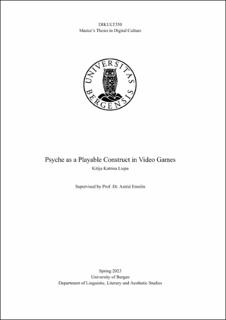| dc.description.abstract | The aim of this master’s thesis called Psyche as a Playable Construct in Video Games is to explore how the human mind is reflected in video games and how thus the psyche becomes a playable environment. This study also analyzes whether video games as a medium can promote self-reflection and empathy by portraying the psyche and developing narratives around this theme. These set objectives are achieved by performing medium-specific multimodal discourse analysis of three case studies, as well as comparative game analysis. The purpose is to discover how the psyche nowadays becomes an accessible, interactive, and embodied virtual environment through various modern modes of expression. In addition to the topic of the psyche as a game setting the research also looks at the reflection of the psyche in the theories of psychoanalysts, the principles of creating playable virtual spaces and mental landscapes, and the unique manner of video games in representing phenomena. This thesis includes a review of relevant scholarship into game studies, psychoanalysis and multimodal discourse, as well as an examination of three video games of different scales and genres, all of which render the human psyche psyche a playable construct: Nevermind (2015), When the Darkness comes (2019) and Psychonauts 2 (2021). By showing distinctive approaches to representing the psyche and interaction with it, this research highlights the enormous potential of video games to offer their users experiences that cannot be delivered through any other channel. As well, my thesis demonstrates how game design reflects scientific discoveries about the psyche to the present day: as independent but influenceable; chaotic and multi-layered but deterministic. It also proposes future research suggestions in this context on how likely are games set in the human mind to promote compassion, empathy, and self-analysis in a wide audience. | |
